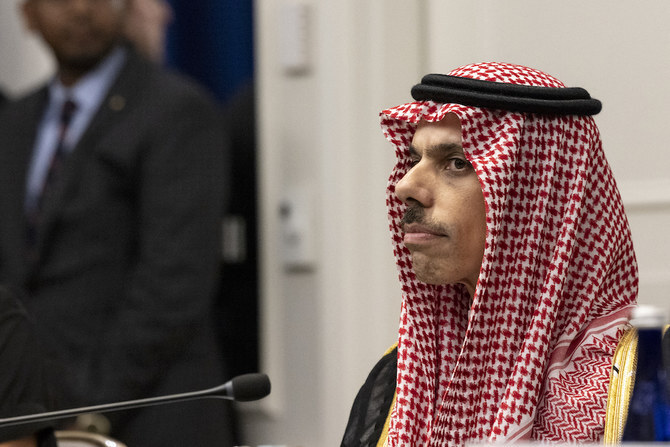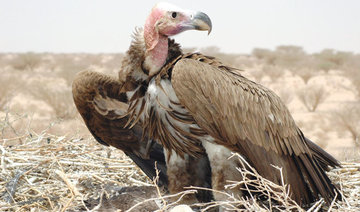RIYADH: Saudi foreign minister Prince Faisal bin Farhan on Saturday held a phone call with his Algerian counterpart Ahmed Attaf, state news agency SPA reported.
During the call, the two ministers discussed Gaza developments and reiterated the need for increased coordination to achieve a ceasefire.
They also emphasized “intensified efforts to halt the ongoing Israeli escalation and violations against the Palestinian people,” said SPA.
Saudi foreign minister discusses Gaza with Algerian counterpart
https://arab.news/wx8tb
Saudi foreign minister discusses Gaza with Algerian counterpart

Saudi Arabia and Bahrain sign agreement to complete medical city project

- Project marks major collaboration between two countries in field of medical education and healthcare infrastructure
MANAMA: Bahrain’s King Hamad bin Isa Al-Khalifa met with Saudi Arabia’s Minister of Education, Yousef bin Abdullah Al-Bunyan, at Al-Sakhir Palace on Sunday during the latter’s visit to sign an agreement for the completion of King Abdullah bin Abdulaziz Medical City.
The project, being carried out by the Arabian Gulf University, marks a major collaboration between the two countries in the field of medical education and healthcare infrastructure, the Saudi Press Agency reported.
During the meeting, Al-Bunyan conveyed greetings from Saudi Arabia’s King Salman and Crown Prince Mohammed bin Salman, along with their wishes for Bahrain’s continued development, SPA added.
He also underlined the importance Saudi Arabia places on strengthening its longstanding relationship with Bahrain, particularly in the education sector.
King Hamad welcomed the minister and reciprocated the well-wishes, reaffirming Bahrain’s appreciation for the strong ties between the two nations.
He expressed satisfaction with the progress of joint projects, particularly King Abdullah Medical City, which he said reflected the depth of cooperation between Bahrain and Saudi Arabia.
Riyadh community reclaims power of writing

- Kitabah initiative for Arabic writers carves out a space for creativity
RIYADH: What would happen if you wrote every day for 100 days? In Riyadh, a growing Arabic writing community has taken on the challenge, inviting writers of all levels to rediscover the joy of writing one day at a time.
The “100 Days of Writing” initiative offers a space for reflection, consistency and expression, far from the pressures of social media.
“Writing is an essential tool for anyone who wants to think,” Mohammad Aldhabaa, founder of the community, told Arab news.
He said that writing can serve as a form of meditation and healing, helping individuals process emotions and better understand themselves.
“There are many things you can do with writing on a personal level, to reflect, to deconstruct identity, and to make sense of experiences, he said.

There are many things you can do with writing on a personal level, to reflect, to deconstruct identity, and to make sense of experiences.
Mohammad Aldhabaa, Kitabah founder
While the community grew, Aldhabaa saw firsthand the challenges Arab writers face online: “We don’t have the infrastructure to allow writers in Arabic to write and publish their work and to reach their audience using modern digital tools,” Aldhabaa explained.
Many writers are forced to rely on fragmented, English-oriented services like newsletter platforms and generic website builders. It is hard to expect consistent, high-quality content in Arabic without a proper system that incentivizes writers, he said.
Out of this need for better infrastructure, the community built its own solution: Kitabah, a publishing platform designed specifically for Arabic writers.
The platform allows users to publish work, create personal websites, and in future phases, monetize their writing.
Kitabah integrates social features to help writers grow their audience without having to independently market their work, similar to Substack or Medium which are useful for writers working in English.
“We didn’t want to create separated islands where each writer builds a blog and struggles to bring in traffic,” Aldhabaa said. “Everything is distributed through the Kitabah feed, and also you have your own website.”
He explained that writers can publish, connect their work to a newsletter, and link their personal site across social media. “There’s a traffic engine behind it, so writers don’t have to do all the heavy lifting.”
Initiatives like this can help shape the Kingdom’s literary and cultural landscape, he said, by empowering more writers to tell locally rooted stories.
“That is very important and crucial, playing into the soft power of Saudi Arabia the ability to have way more writers and creators be able to focus on telling stories about the communities we grew up in, the stories we come from. Because there is something that is very valuable and has very impactful results,” he said.
The community attracts experienced writers and absolute beginners. “We don’t want it to be only seasoned writers who already have a certain level of achievement because the idea of the community is to allow people to try and to learn, and not to create a status-based community.”
Hanen Shahin, a member of the community, said: “The writing community is an alternative environment to the forums we used to write in years ago. Social media came along and made it a competitive space driven by numbers and algorithms, an unhealthy environment for emerging writers, and sometimes even a damaging one.”
Shahin said that writing communities, by contrast, offer the guidance and perspective many writers need.
“You’re not just writing consistently but doing so while receiving feedback from people with refined taste and diverse backgrounds, which gives you a broader view of your work.”
Lana Elsafadi, another member, said: “Writing has helped me know myself better and get better at sorting out my feelings clearly. I feel really good when I can make a helpful comment that shows a deep idea or gives good advice, whether it’s about personal things or work.”
One hundred days may seem a big challenge, but for many writers in Riyadh, it is just the beginning.
Saudi crown prince, Al-Sharaa discuss Syria’s stability and security

- Al-Sharaa thanked Saudi Arabia for its “continued support,” highlighting the Kingdom’s role in strengthening Syria’s territorial integrity and stability
RIYADH: Saudi Crown Prince Mohammed bin Salman and Syria’s President Ahmed Al-Sharaa held a phone call on Sunday, the Saudi Press Agency reported.
During the call, the crown prince and Al-Sharaa discussed the latest developments in the Syrian Arab Republic, and reviewed all efforts to support its security and stability, SPA added.
According to a Syrian Presidency statement, Prince Mohammed “reiterated the Kingdom’s commitment to supporting Syria’s security and stability, encouraging political solutions that preserve the country’s unity, and contributing to its reconstruction.”
He also emphasized Saudi Arabia’s keenness to expand economic and investment ties with Syria in the period ahead, the statement added.
Al-Sharaa thanked Saudi Arabia for its “continued support,” highlighting the Kingdom’s role in strengthening Syria’s territorial integrity and stability.
Endangered vulture spotted in Saudi Arabia’s Northern Borders

- With a 3.1-meter wingspan and weighing up to 14 kilograms, the black vulture is one of the largest of the old world raptors
- Its population numbers have plummeted in the past two centuries because of habitat loss and human activity
RIYADH: An endangered Eurasian black vulture was spotted near the village of Linah in Saudi Arabia’s Northern Borders region, the Saudi Press Agency reported.
The sighting of the bird, which began its migration about 2,000 kilometers away in Armenia, underscores the reserve’s importance as a sanctuary for migratory species.
With a 3.1-meter wingspan and weighing up to 14 kilograms, the black vulture is one of the largest of the old world raptors. Its population numbers, however, have plummeted in the past two centuries because of habitat loss and human activity.
Nasser Al-Majlad, chairman of the Aman Environmental Association, said that the region’s location — bridging Asia, Africa and Europe — coupled with its diverse terrain and lush vegetation, attracts more than 300 bird species every year.
Al-Majlad said that the consistent passage of migratory birds reflects ecosystem stability and enriches the cultural landscape, adding that the phenomenon offers residents and researchers unique opportunities to study avian biodiversity.
Saudi Arabia’s Imam Turki bin Abdullah Royal Reserve Development Authority and the Northern Borders region’s Aman Environmental Association marked World Migratory Bird Day 2025 on May 10-11 by advocating for the conservation of migratory birds under the theme “Shared Spaces: Creating Bird-Friendly Cities and Communities.”
The events highlighted the ecological significance of the reserve and the Northern Borders region more widely.
Saudi Arabia’s annual participation in World Migratory Bird Day aligns with global conservation goals.
This year’s theme emphasized integrating bird-friendly practices into urban development to mitigate challenges such as habitat fragmentation.
The Northern Borders region is a vital migratory corridor, its strategic geographical location bridging Europe, Africa and Asia.
Migratory birds play an important role in the ecosystem by dispersing seeds, controlling insect populations, and enhancing biodiversity, making them a vital element in sustaining the environmental life cycle.
Riyadh hospital performs first pediatric robotic liver transplant

- Although procedure was complicated, center’s experience with robotic organ transplants in adults enabled the technology to be adapted
RIYADH: The King Faisal Specialist Hospital and Research Centre in Riyadh has performed a liver lobe transplant on an eight-year-old child using an advanced robotic surgical system, with the patient being discharged after just two weeks.
Although the procedure was complicated due to the child’s small size and limited space for surgical access, the center’s experience with robotic organ transplants in adults enabled the technology to be adapted.
A tailored surgical plan was developed, which involved repositioning the robotic entry points, the Saudi Press Agency reported on Sunday.
Prof. Dieter Broering, executive director of the Organ Transplant Centre of Excellence and lead surgeon, said: “Robotic surgical techniques have traditionally been limited to adults, but we succeeded in adapting them for children, offering exceptional precision and a marked reduction in complications.
“The transplant required redesigning the surgical approach to suit the child’s small body and confined space, which we addressed by meticulously adjusting the entry sites for the robotic tools to ensure maximum safety.”
The operation sets a groundbreaking example for expanding the use of robotic surgery in pediatric care. The technology offers precise control, reduces complications and enhances safety, paving the way for the future development of child-specific robotic surgical systems.
It is the latest milestone that positions King Faisal Centre as a global leader in robotic surgery. The hospital has previously carried out the world’s first fully robotic heart transplant and the first robotic liver transplant.





















